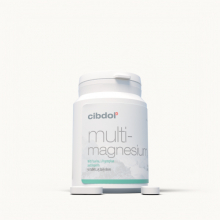Can I Take Magnesium & Vitamin D Together?
Last updated:
Published:
Importance of Balancing Vitamin D and Magnesium Levels
Are you wondering about the bioavailability of minerals like magnesium and vitamin D2 for heart health? Well, let's dive into the significance of maintaining a proper balance between these two essential nutrients. Achieving optimal levels of both vitamin D and magnesium is vital for your overall well-being.
Contents:
- Importance of Balancing Vitamin D and Magnesium Levels
- Understanding the Role of Magnesium in Activating Vitamin D
- Optimal Dosages for Combining Magnesium and Vitamin D
- Recognizing Symptoms of Deficiencies in Magnesium and Vitamin D
- Natural Methods to Increase Magnesium and Vitamin D Levels
- Conclusion
-
FAQs
- How long does it take to see the benefits of taking magnesium and vitamin D together?
- Are there any side effects of taking magnesium and vitamin D together?
- Can I get enough magnesium and vitamin D from my diet alone?
- Should I take magnesium oxide or another form of magnesium when combining it with vitamin D?
- Can I take magnesium and vitamin D together if I have a medical condition or take prescription medications?
Imbalances in minerals and nutrients can cause various health issues, including diabetes. For example, insufficient magnesium levels can affect the bioavailability of vitamin D, reducing its effectiveness. Similarly, low vitamin D levels can impact calcium absorption, which depends on adequate magnesium levels.
Understanding the importance of balancing minerals and bioavailability is crucial. Their synergistic benefits contribute to bone health, immune function, muscle strength, and more. So don't overlook the significance of maintaining appropriate blood levels for both vitamin D3 and magnesium to prevent sarcopenia.
By prioritizing enough magnesium intake, you can support your body's functions and improve your overall health. Remember: it's not just about individual nutrient levels; it's about finding harmony between magnesium intake, other minerals, and magnesium supplements.
So, let's explore how people can strike that perfect balance for heart health by ensuring they have enough magnesium in their diet in the right form!

The Synergistic Relationship Between Magnesium and Vitamin D
Magnesium and vitamin D are two essential nutrients that play crucial roles in maintaining optimal health. What many people may not realize is that these two nutrients have a synergistic relationship, meaning they work together to enhance each other's benefits within the body. This is particularly important for maintaining proper blood levels of minerals like calcium and activating receptors in the body.
Activation of Vitamin D
One of the key roles magnesium plays is in activating vitamin D in people. When people consume vitamin D through sources like sunlight exposure or dietary supplements, it undergoes a series of transformations in their bodies before becoming active. This activation process involves an enzyme called hydroxylase, which converts vitamin D into its active form, known as vitamin D3 in people.
Magnesium is required for the proper functioning of hydroxylase. Without sufficient magnesium levels, this enzymatic reaction cannot occur effectively, leading to impaired synthesis and metabolism of vitamin D. Therefore, taking magnesium alongside vitamin D ensures that this activation process can take place efficiently.
Enhanced Absorption
In addition to activating vitamin D, magnesium also enhances its absorption within the body. Calcium is another mineral that relies on adequate levels of both magnesium and vitamin D for optimal absorption. When calcium is absorbed properly, it contributes to strong bones and teeth.
By taking magnesium with vitamin D supplements or increasing dietary intake of both nutrients simultaneously, you create an environment where calcium absorption is maximized. This synergy between magnesium and vitamin D promotes better bone health by ensuring that calcium is effectively utilized by the body.
Benefits for Bone Health and Immune Function
The combination of magnesium and vitamin D offers numerous benefits beyond their individual functions. Together, they promote better bone health by supporting calcium absorption and utilization. Strong bones are crucial for overall physical well-being and can help reduce the risk of fractures or conditions like osteoporosis.
Furthermore, both nutrients play vital roles in immune function. Adequate levels of magnesium contribute to a healthy immune system by supporting white blood cell production and function. Vitamin D, on the other hand, helps regulate immune responses and has been linked to a lower risk of autoimmune diseases.
Contributions to Cardiovascular Health and Mood Regulation
The synergistic relationship between magnesium and vitamin D extends beyond bone health and immune function. Studies have shown that both nutrients contribute to cardiovascular health. Magnesium helps regulate blood pressure levels, while vitamin D is associated with a reduced risk of heart disease.
Moreover, these nutrients also play a role in mood regulation. Low levels of magnesium have been linked to an increased risk of depression, anxiety, and other mood disorders. Vitamin D deficiency has also been associated with mood disturbances. By ensuring adequate intake of both nutrients, you can support your overall well-being and promote a positive mood.
Understanding the Role of Magnesium in Activating Vitamin D
Magnesium plays a crucial role in activating vitamin D to its active form, known as calcitriol. This activation process is essential for enabling vitamin D to carry out its numerous functions within the body.
Without sufficient magnesium levels, vitamin D cannot be fully utilized by the body. This means that even if you are taking vitamin D supplements or getting enough sunlight exposure, without adequate magnesium, you may not be reaping all the benefits of this essential nutrient.
Magnesium steps in as a co-factor, assisting in enzymatic reactions that activate the vitamin in the kidneys and liver (Magnesium et al).
Once converted into calcitriol, vitamin D can effectively regulate calcium, phosphorus, and magnesium deficiency metabolism. It promotes the absorption of calcium from the intestines while preventing excessive loss through urine. It helps maintain proper bone health and supports immune function in cases of magnesium deficiency.
Adequate magnesium levels are necessary for maximizing the benefits of vitamin D supplementation or sun exposure (et al). Without enough magnesium present, some researchers suggest that excess unactivated vitamin D may accumulate within the body instead of being converted into its active form.
To ensure optimal utilization of both magnesium and vitamin D:
-
Consume foods rich in magnesium: Incorporate foods such as spinach, almonds, avocados, black beans, bananas, and dark chocolate into your diet.
-
Consider taking a combined supplement containing both magnesium and vitamin D et al. to support their synergistic relationship.
-
Get regular sun exposure: Sunlight is a natural source of both magnesium and vitamin D synthesis in our bodies.
-
Avoid excessive alcohol consumption: Alcohol can interfere with both magnesium absorption and conversion of inactive vitamin D.
-
Consult with your healthcare provider: If you have concerns about your magnesium or vitamin D levels or are considering supplementation, it is always best to consult with a healthcare professional.
Benefits of Taking Magnesium and Vitamin D Together
Support Bone Strength and Density
The combined intake of magnesium and vitamin D can play a crucial role. Both nutrients work synergistically to support bone strength and density. Magnesium is involved in the regulation of calcium metabolism, which is essential for proper bone formation. Vitamin D, on the other hand, helps the body absorb calcium from the diet.
By taking magnesium and vitamin D together, you can ensure that your body has an adequate supply of both nutrients to support optimal bone health. This is particularly important as we age since bone density tends to decrease over time, increasing the risk of conditions like osteoporosis and fractures.
Reduce Risk of Osteoporosis and Fractures
Osteoporosis is a condition characterized by weakened bones that are more prone to fractures (et al). By combining magnesium and vitamin D supplementation, you can help reduce the risk of developing osteoporosis and experiencing fractures.
Magnesium aids in maintaining bone integrity by regulating calcium levels within the body. It assists in preventing excessive calcium loss from bones, which can weaken them over time. Vitamin D enhances calcium absorption from food sources, ensuring that enough calcium reaches your bones for optimal strength.
Improve Joint Health
Not only do magnesium and vitamin D support bone health but they also contribute to joint health. These nutrients work together to promote cartilage formation, which plays a vital role in maintaining healthy joints.
Cartilage acts as a cushion between bones, allowing smooth movement without friction or pain. When magnesium levels are insufficient, cartilage may become weak or deteriorate faster than it can be repaired. Vitamin D deficiency can also impact joint health by impairing cartilage regeneration processes.
By taking both magnesium and vitamin D supplements together, you provide your joints with the necessary building blocks for robust cartilage formation. This not only supports joint mobility but also helps prevent conditions like arthritis.
Enhance Immune System Function
In addition to their roles in bone and joint health, magnesium and vitamin D also play a crucial role in supporting immune system function. A strong immune system is essential for defending the body against infections and illnesses.
Magnesium helps regulate immune responses by influencing the production and activity of various immune cells. It aids in maintaining a healthy balance between pro-inflammatory and anti-inflammatory processes, ensuring optimal immune function.
Vitamin D, on the other hand, plays a vital role in activating certain immune cells that help fight off infections. It also helps regulate the expression of genes involved in immune system regulation.
By combining magnesium and vitamin D supplementation, et al, you can enhance your immune system's ability to defend against pathogens, reducing your susceptibility to infections.
Optimal Dosages for Combining Magnesium and Vitamin D
It's important to understand the recommended dosages for optimal results. This is especially true when considering the combination of magnesium and vitamin D. While the ideal dosage may vary depending on factors such as age, sex, and individual needs, there are some general guidelines that can help steer you in the right direction.
First and foremost, it is crucial to consult with a healthcare professional before starting any new supplement regimen. They will be able to provide personalized recommendations based on your specific circumstances. With that being said, let's delve into the typical dosages for combining magnesium and vitamin D.
For adults, a daily intake of approximately 400–800 IU (International Units) of vitamin D alongside 200–400 mg (milligrams) of magnesium is often recommended. However, these numbers can fluctuate depending on various factors. Pregnant or lactating women may require higher doses of both nutrients to support their changing needs. Individuals with certain medical conditions or deficiencies might need different dosages altogether.
Maintaining an appropriate ratio between magnesium and vitamin D is also crucial for optimal results. Some experts suggest a ratio of 2:1 in favor of magnesium when combining these two supplements. For example, if you're taking 400 IU of vitamin D per day, aim for around 200 mg of magnesium.
Now let's take a closer look at why these specific dosages are recommended.
Vitamin D plays a vital role in calcium absorption and bone health. It also contributes to immune function and overall well-being. However, excessive amounts can lead to toxicity symptoms such as nausea, vomiting, weakness, and even kidney problems. Therefore, it's important not to exceed the recommended daily dosage.
Similarly, while magnesium is essential for numerous bodily functions including muscle relaxation and nerve transmission, too much can cause diarrhea or other gastrointestinal issues. Striking the right balance is key to reaping the benefits without experiencing any adverse effects.
To ensure you're getting the correct doses of both magnesium and vitamin D, it's best to rely on high-quality supplements from reputable brands. Look for products that have undergone third-party testing to verify their potency and purity. Your healthcare professional can also recommend trusted brands that align with your specific needs.
Recognizing Symptoms of Deficiencies in Magnesium and Vitamin D
Magnesium deficiency is a condition that can lead to various health issues, including muscle cramps, fatigue, and even irregular heartbeat. When our bodies lack sufficient magnesium levels, these symptoms can arise and affect our overall well-being. It's essential to recognize these signs as they may indicate the need for magnesium supplementation.
Similarly, low levels of vitamin D can also have adverse effects on our health. Some common symptoms of vitamin D deficiency include bone pain, weakened immune system, and even depression. Without enough vitamin D, our bodies may struggle to absorb calcium properly, which can lead to problems like osteoporosis or weakened bones.
Identifying the symptoms associated with magnesium and vitamin D deficiencies is crucial in determining whether supplementation is necessary. If you experience any of the aforementioned symptoms or suspect a potential deficiency, it's important to consult with your healthcare provider for proper evaluation and guidance.
To assess magnesium and vitamin D levels accurately, regular blood tests are recommended. These tests will measure the concentration of these nutrients in your bloodstream and help identify any deficiencies or imbalances. By monitoring your mineral status through blood tests, you can take proactive steps towards addressing any potential deficiencies before they escalate into more severe health issues.
Magnesium deficiency has been linked to several diseases such as diabetes, sarcopenia (age-related muscle loss), and even cardiovascular disease. Low magnesium levels have been associated with an increased risk of fractures due to compromised bone strength. Ensuring adequate magnesium intake is vital for maintaining healthy bones and preventing conditions like osteoporosis.
On the other hand, vitamin D deficiency is often associated with rickets in children—a condition characterized by weak or soft bones—and osteomalacia in adults—a condition where bones become weak due to poor mineralization. Both conditions emphasize the importance of sufficient vitamin D levels for optimal bone health.
It's worth noting that both magnesium and vitamin D play crucial roles beyond bone health. Magnesium, for instance, is involved in over 300 biochemical reactions in the body and is necessary for proper nerve function, muscle contraction, and maintaining a steady heartbeat. Vitamin D, on the other hand, acts as a hormone in the body and affects various processes such as immune function and cell growth.
Natural Methods to Increase Magnesium and Vitamin D Levels
Boosting Magnesium Levels with Food
Consuming magnesium-rich foods is an excellent way to naturally increase your magnesium levels. Incorporating leafy greens, nuts, and seeds into your diet can provide a significant boost of this essential mineral. Leafy greens like spinach and kale are not only packed with magnesium but also offer a host of other health benefits. Nuts such as almonds and cashews are not only delicious but also contain high amounts of magnesium. Seeds like pumpkin and sunflower seeds are another great option to consider.
Stimulating Vitamin D Production through Sun Exposure
Sun exposure plays a crucial role in stimulating the body's natural production of vitamin D. Spending time outdoors under the sun allows your skin to absorb ultraviolet B (UVB) rays, which trigger the synthesis of vitamin D. However, it is essential to be mindful of sun safety practices by avoiding excessive exposure during peak hours when the sun's rays are strongest. A few minutes in the early morning or late afternoon sunlight can help optimize your body's vitamin D production.
Incorporating Fatty Fish for Vitamin D Intake
Another effective method for increasing your vitamin D intake is by incorporating fatty fish into your diet. Fish such as salmon, mackerel, and sardines are excellent sources of this vital nutrient. These oily fish varieties not only provide omega-3 fatty acids but also contain substantial amounts of vitamin D. By including them in your meals a few times a week, you can naturally enhance your vitamin D levels while enjoying their delicious flavors.
Fortified Dairy Products and Supplements
In addition to dietary sources, fortified dairy products can contribute significantly to meeting your daily vitamin D requirements. Many brands fortify milk, yogurt, and cheese with extra vitamin D to ensure adequate intake among consumers. Checking product labels for added vitamin D content can help you make informed choices while grocery shopping. If you struggle to consume enough vitamin D through diet alone, supplements are another option worth considering. Consult with a healthcare professional to determine the appropriate dosage and type of supplement that suits your needs.
Balancing Diet and Sun Exposure for Optimal Levels
Maintaining optimal levels of both magnesium and vitamin D requires striking a balance between a healthy diet and adequate sun exposure. By incorporating magnesium-rich foods like leafy greens, nuts, and seeds into your meals, you can naturally boost magnesium levels. Simultaneously, spending moderate amounts of time outdoors under the sun allows your body to synthesize vitamin D. Remember to practice sun safety by avoiding excessive exposure and protecting your skin when necessary.
Conclusion
In conclusion, combining magnesium and vitamin D can provide numerous health benefits. These two nutrients have a synergistic relationship, with magnesium playing a crucial role in activating vitamin D within the body. By taking them together, you can optimize their effectiveness and enhance their positive impact on your overall well-being.
It is important to consult with a healthcare professional who can provide personalized recommendations based on your specific needs. They will consider factors such as your age, sex, overall health, and any existing deficiencies or medical conditions.
Recognizing symptoms of deficiencies in magnesium and vitamin D is also essential. Common signs include muscle cramps, fatigue, mood swings, weakened immune function, and bone density issues. If you experience these symptoms or suspect a deficiency, it is advisable to seek medical advice for proper diagnosis and treatment.
Fortunately, there are natural methods to increase your levels of both magnesium and vitamin D. Consuming foods rich in these nutrients such as leafy greens (spinach), nuts (almonds), seeds (pumpkin seeds), fatty fish (salmon), and fortified dairy products can help boost your intake. Spending time outdoors in sunlight allows your body to naturally produce vitamin D.
To ensure the highest quality supplements that meet safety standards and efficacy requirements, it is recommended to choose reputable brands that prioritize product quality through rigorous testing processes. Reading customer reviews and seeking recommendations from trusted sources can also help guide your purchasing decisions.
Incorporating magnesium and vitamin D into your daily routine can contribute to improved overall health. However, it is always important to remember that individual results may vary. Therefore, if you have any concerns or questions regarding the use of these supplements or their potential interactions with other medications or conditions you may have, consult a healthcare professional before starting any new regimen.
Remember: Taking care of your health should be a priority! By being proactive about maintaining adequate levels of magnesium and vitamin D, you can support your body's functions and promote a healthier lifestyle.
FAQs
1. Can I take magnesium and vitamin D together if I am already taking other supplements?
Yes, you can generally take magnesium and vitamin D together with other supplements. However, it is recommended to consult with a healthcare professional to ensure there are no potential interactions or adverse effects between the different supplements.
2. How long does it take to see the benefits of taking magnesium and vitamin D together?
The timeframe for experiencing the benefits of combining magnesium and vitamin D may vary from person to person. It depends on factors such as your current nutrient levels, overall health, and consistency in taking the supplements. It is advisable to be patient and give it time for the nutrients to build up in your system before expecting noticeable results.
3. Are there any side effects of taking magnesium and vitamin D together?
When taken within recommended dosages, both magnesium and vitamin D are generally safe for most individuals. However, excessive intake may lead to side effects such as diarrhea (magnesium) or nausea/vomiting (vitamin D). It is important to follow dosage guidelines provided by healthcare professionals or stated on supplement packaging.
4. Can I get enough magnesium and vitamin D from my diet alone?
While it is possible to obtain some amounts of these nutrients through diet alone, many people struggle to meet their daily requirements solely through food sources. This is why supplementation can be beneficial in ensuring adequate intake of both magnesium and vitamin D.
5. Should I take magnesium oxide or another form of magnesium when combining it with vitamin D?
Different forms of magnesium have varying absorption rates in the body. Magnesium citrate, glycinate, or malate are often considered more bioavailable than magnesium oxide. Therefore, choosing one of these forms may enhance the effectiveness when combined with vitamin D supplementation.
6. Can I take magnesium and vitamin D together if I have a medical condition or take prescription medications?
If you have a medical condition or are taking prescription medications, it is important to consult with your healthcare provider before starting any new supplements, including magnesium and vitamin D. They can evaluate potential interactions and provide guidance specific to your situation to ensure your safety and well-being.


















